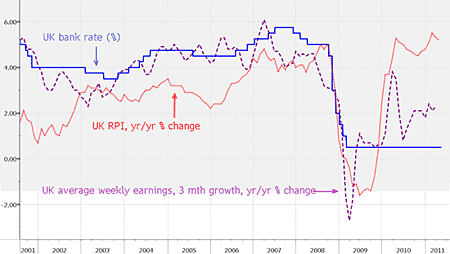For all the talk of ‘rebalancing’, what really matters for UK growth is not manufacturing, but consumer spending.
The bad news is that British retailers are having a miserable time, if last week’s gloomy trading statements were anything to go by.
With inflation likely to stay high, and wages remaining stagnant, it doesn’t look as though life is going to get any easier for the consumer. That suggests the gloom on the high street is here to stay.
But the good news is that there are pockets of value – if you know where to look.
The outlook is grim for British retailers
The markets got a nasty shock last week when Home Retail Group reported its latest figures. The company owns DIY supplier Homebase and catalogue chain Argos, which sells electronic goods amongst other things.
Homebase at least saw its sales rise by 1.6% in the last quarter. But Argos was a horror story. Like-for-like sales crashed 10%. The really scary aspect of the story is that boss Terry Duddy says Argos is holding its own in terms of market share. That suggests that all consumer electronics firms must be taking a right pounding.
In order to shift stock, Argos is being forced to slash prices. Branded 32-inch TVs that sold for £300 a year ago can now be picked up for less than £200, Duddy tells the Evening Standard. This means profit margins are being cut. That’s further bad news for the firm’s overall earnings.
And the immediate outlook is just as bad. “The next quarter could be equally difficult”, says Duddy. “Together with the volatility of overall sales, [that’s] made the balance of the year more difficult to predict. It’s a case of just getting through”.
But ‘just getting through’ might take a lot more grit than many retailers can muster.
Seller of car and bike parts Halfords also produced results last week. These were reasonably good: for the year to end-April, sales were up 4.6% while profits were up 7%. But Halfords’ chief executive, David Wild, reckons the days of easy retailing are gone.
“Customers are battening down the hatches and preparing for a long period of austerity, according to David Wild”, reports the Evening Standard. “I think customers have changed”, says Wild. “They’re no longer gritting their teeth and saying we need to get through the next six months. They’re accepting this is the new reality.”
Consumers are being battered by rising prices and low wage growth
So why have the once-hardy British consumers downed their shopping bags? It all comes down to the fact that the cost of living is climbing much faster than our pay packets are growing. This chart, which comes from our inflation indicators page makes the point.

Look at the gap between the purple line – UK average weekly earnings – and the red line, which indicates Britain’s RPI (the retail price index, which includes housing costs) inflation rate.
Over the last decade, UK wages have grown at least in line with RPI inflation. But now pay is rising at almost 3% a year behind inflation.
That may not sound like much. But remember, the big price surges being seen right now are in food and fuel. So people are having to fork out ever more for life’s essentials, meaning they’ve less and less left over to spend on other things.
This is all clearly bad for the economy as a whole.
But what does it mean for investors?
Well, we’ve written along these lines several times before. And at the end of May, an FT analysis of some Bank of England data came to the conclusion that the current post-recession recovery in consumer spending will be slower than at any time since 1830.
Yet the bad news all seems to have surprised the markets. Up until last week, the general retail sector had been moving bang in line with the overall UK market this year. In other words, the market didn’t rate general retail as being any riskier than your average sector.
Investors are starting to realise that was a mistake. Home Retail shares have plunged by some 17% since Thursday morning. The stock prices of rivals Dixons and Kesa – which owns Comet – have also been clobbered, while Halfords fell too.
Analysts are busily sharpening their red pencils to cut their earnings forecasts. As a result we’d suggest you sell out of any exposure you still have to the general sector.
Yet there is an opportunity here. In March, we tipped grocer Wm Morrison (LSE: MRW) as a defensive safe haven that looked cheap, with a useful yield to boot. Since then it’s up by 7%. Yet rival food retailer J Sainsbury (LSE: SBRY) has gone the other way.
This year, its shares have fallen by 14% despite a decent set of full-year results and an inflation-busting 6.3% dividend hike. The first-quarter statement is due out on Wednesday. On a sub-12 current year p/e, and 4.9% prospective yield, Sainsbury’s now looks cheap.
Category: Economics

